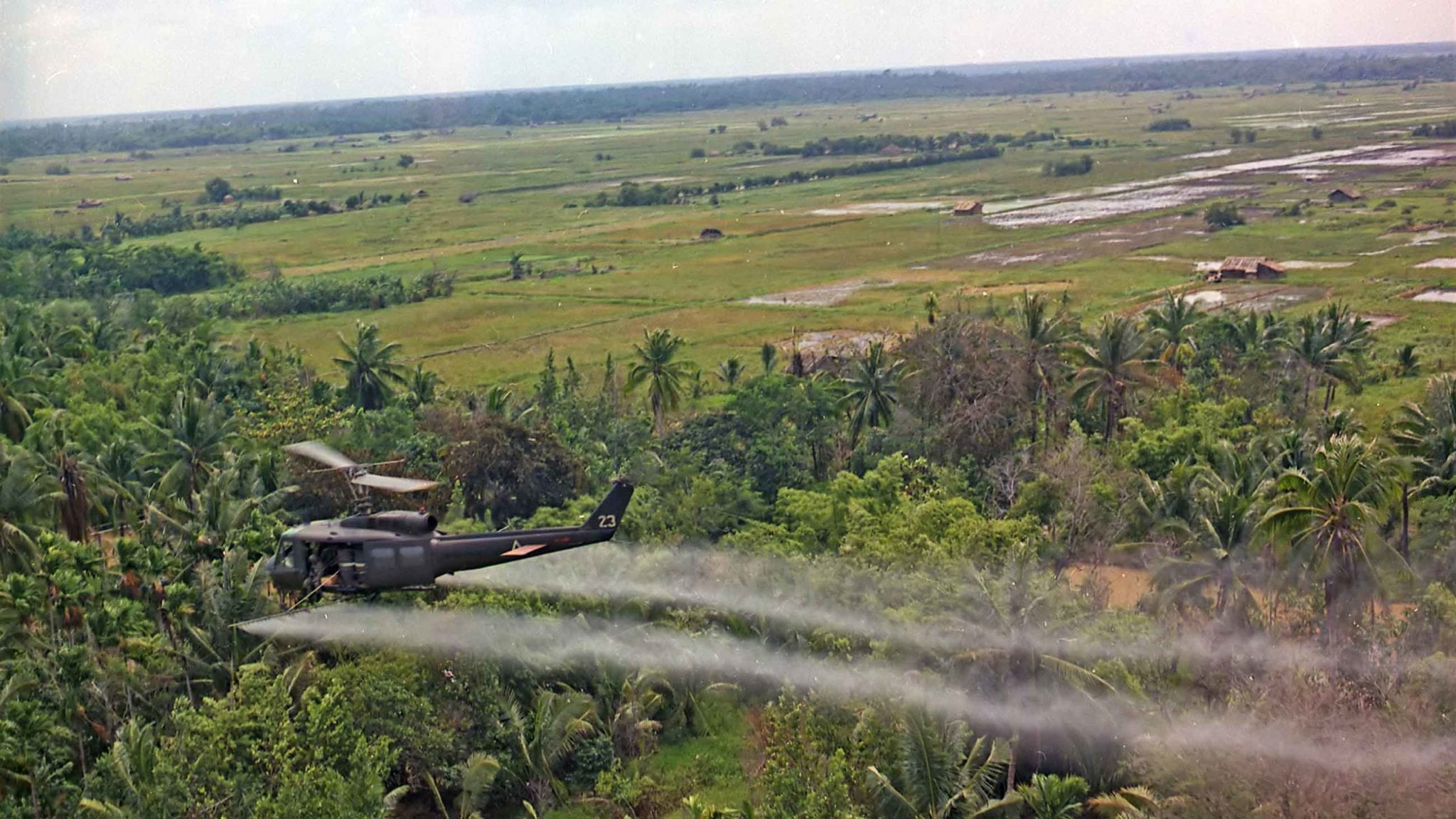
A U.S. soldier of the 9th Infantry Division uses an M79 grenade launcher to guide helicopters into an operation on the northern edge of South Vietnam’s Mekong Delta in mid-July 1968. (Photo: Henri Huet / Associated Press)
A coalition of some 20 veterans groups and others are calling on the Department of Veterans Affairs to add four diseases to the list of those potentially caused by Agent Orange exposure during the Vietnam War.
In a Nov. 15 letter to VA Secretary Robert Wilkie, the heads of the organizations, which include National Commander Bill Oxford of The American Legion, seek the immediate addition of illnesses to the Agent Orange presumptive disease list.
“It is rare, indeed, for this many major VSOs to combine forces and jointly sign such a letter,” said Larry Van Kuran, The American Legion’s national executive committeeman representing California. “This is indicative of the seriousness of the situation in the eyes of our American Legion and the other major VSO signatories.”
VA told The American Legion on Thursday it currently has no announcements on changes to the list and is awaiting the results of two new studies being conducted by VA to help guide its decision-making on the issue. The “Vietnam Era Health Retrospective Observational Study” is comparing the health of veterans who served in the era of question to those U.S. residents in the same age group. No information was provided on the second, “Vietnam Era Mortality Study” and VA did not respond to emails requesting clarification by story deadline.
“VA remains committed to the care of Vietnam Veterans and the continued study of Agent Orange and its associated adverse health effects,” a VA spokesperson wrote in an email. “VA is committed to regular review of all emerging evidence of adverse impacts to Veterans from Agent Orange, but the department will not be announcing any new presumptive conditions until there is sufficient evidence to support an informed decision.”

Defoliation Mission: A UH-1D helicopter from the 336th Aviation Company sprays a defoliation agent on agricultural land in the Mekong delta. (Photo: Brian K. Grigsby, SPC5, National Archives)
Millions of gallons of the herbicide were tactically sprayed over the dense jungles of Vietnam. There are about 14 forms of cancer, diabetes, neurological diseases and others the VA has linked to Agent Orange exposure. Presumptive diseases are those that may not be directly caused by military service but can be linked secondarily and thus qualify a veteran for benefits.
Because of this connection, there are also certain birth defects in the children of Vietnam and Korea veterans associated with exposure to dangerous chemicals during those conflicts. Though Agent Orange is commonly associated with Vietnam, the toxic chemical was stored and possibly tested near the Korea demilitarized zone that separates South Korea from its Communist northern counterpart.
The addition of the four diseases to the list could represent a significant increase in the dollar amount of benefits paid to veterans with Agent Orange exposure, though no cost analysis has been revealed.
So-called “Blue Water Navy” veterans won a federal court battle in January over whether they could receive disability ratings for Agent Orange exposure while serving offshore aboard ships during the Vietnam War. The Congressional Budget Office estimated payouts of $1.1 billion over 10 years, but the VA claimed it would be closer to $6 billion, Stars and Stripes reported.
“At a March 2019 congressional hearing, Dr. Richard Stone, Executive in Charge of the Veterans Health Administration (VHA) indicated that a decision on these presumptions could be released within 90 days.” The coalition letter read. “At a Senate hearing in September, Dr. Patricia Hastings, VA Chief Consultant, Post-Deployment Health, noted that VA leadership, in accordance with Policy 0215, had been actively considering the addition of these diseases since early summer.”
Some 83,000 veterans stand to gain from the addition of the Agent Orange afflictions, which include bladder cancer, hypothyroid conditions, Parkinson’s-like symptoms and hypertension. The National Academies of Sciences, Engineering and Medicine in 2016 recommended the first three illnesses be added and went further to upgrade hypertension in a 2018 report.
Perhaps it’s not surprising then that the Office of Management and Budget objected to proposed additions to Agent Orange list two years ago and blocked its enactment, according to an October Military Times investigation.
A redacted March 2018 letter written by then-VA Secretary David Shulkin to OMB Director Mick Mulvaney and obtained through a Freedom of Information Act request revealed the bureaucratic red tape.
In one memo, Shulkin said the OMB and White House officials lacked any “detailed evidence,” “refutable rationale” or “implied limitations in the scientific support” of the regulatory proposal in the OMB’s denial of it.
“We are especially concerned by the recent release of internal documents that indicate Administration officials challenged the previous Secretary’s authority to add these four diseases and may have even impeded action,” read the Nov. 15 coalition letter. “Even more troubling is the possibility that the Administration is outweighing the cost of adding these diseases over those veterans in need of VA benefits and health care.”
The coalition letter was signed by Disabled American Veterans, Veterans of Foreign Wars, The American Legion, Vietnam Veterans of America, Military Officers Association of America, Fleet Reserve Association, Paralyzed Veterans of America, AMVETS, Military Order of the Purple Heart, Jewish War Veterans of the U.S.A., Blinded Veterans Association, VetsFirst, United Spinal Association, Association of the United States Navy, U.S. Coast Guard Chief Petty Officers Association, Chief Warrant & Warrant Officers Association-USCG, Air Force Sergeants Association, TREA: The Enlisted Association, Army Aviation Association of America, AMSUS, the Society of Professional Health Professionals and Gold Star Wives of America.













